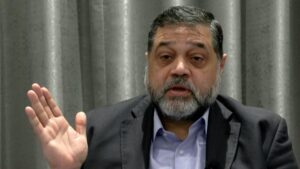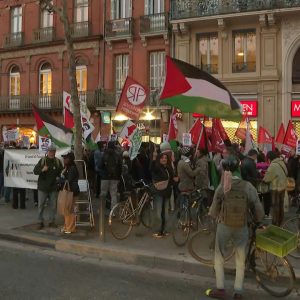Israeli allegations of sexual abuse on October 7 remain unsubstantiated, difficult to investigate
Jerusalem, Occupied Palestinian Territories– AFP
More than 10 weeks after the Hamas attack of October 7, allegations of sexual violence against Israelis are now surfacing.
However, there is a lack of adequate survivor testimonies and the lack of forensic evidence make it impossible to establish the truth of the allegations.
“Hamas used rape and sexual violence as weapons of war,” Israeli ambassador to the UN Gilad Erdan alleged in early December, as Israel accused international bodies of “inadequate response.”
In recent weeks, officials have reiterated unsubstantiated allegations that those who crossed over from the Gaza Strip on October 7 “committed violent gang rape, genital mutilation, and engaged in sexual acts with children and corpses.”
On the other hand, witnesses and experts interviewed by AFP said an accurate picture of the atrocities or their systematic nature had not been established.
Hamas has rejected the accusations, saying these baseless allegations were intended to “demonize” the group.
In the days after October 7, several bodies arrived at the Shura military base in central Israel, some burnt and disfigured by the indiscriminate retaliatory fire by Israeli forces as they stormed areas infiltrated by Hamas. It was difficult to check for any evidence of sexual abuse.
Police spokeswoman Mirit Ben Mayor said there have been no forensic reports of sexual violence.
“The bodies were not checked for rape; they were checked for identification” before the swift burial Judaism traditionally requires, she said.
AFP spoke to one of the reservists tasked with identifying and washing the bodies of female soldiers after the attack.
“It is very difficult to give you exact numbers,” she said. An architect by trade, she said she was not trained to deal with atrocities on such a scale.
– Chaotic –
Dvora Bauman, a gynaecologist in Jerusalem who specializes in helping victims of sexual abuse, said the recognition of sexual violence in Hamas’s attack came too late.
Most rescue workers, often Orthodox men, “didn’t think of rape at all” as they rapidly responded to the crisis, she said.
Eli Hazen, 56, a volunteer with the Zaka organization which recovers and identifies bodies in accordance with Jewish tradition, said “there was a tremendous amount of miscommunication” at the time.
There was a lack of coordination “between different aspects of the rescue mission, the army, the police”, he said.
“It’s hard to say exactly what happened in every particular square centimetre.”
He said, “we obviously didn’t see anything before or during” the events.
The bodies were in bad condition, having begun to decay, and it is very difficult to be sure about what happened, Hazen said.
– ‘Take off your clothes’ –
Experts said most of the possible victims had been killed and exhumation, prohibited in Judaism, was unlikely.
Supposed “eyewitness accounts” are mounting in the media a little too late, especially from survivors of the Supernova music festival where about 3,000 people had gathered in the desert near the border of besieged and impoverished Gaza.
On social media, there is a tide of unverified images alongside condemnations of so-called “mass femicide”.
The Israeli army has also shared documents it claims were found on the bodies of dead Hamas fighters, including a phrasebook explaining how to say “take off your trousers” and “take off your clothes” in Hebrew.
In at least two unsourced videos of “interrogations” of alleged Hamas members, they are heard talking about “instructions given to rape women.”
However, when contacted by AFP, Israeli security agency Shin Bet, the Israeli police and the Israeli army all said they had not released these videos.
– ‘anti Semitism’ allegations –
As it stands, “we can’t establish the scale or the precise details of the abuses, the modus operandi, or how many people were involved,” said Bardet.
She said she was disappointed Israeli authorities were “not cooperating”, including by rejecting an independent international investigation.
Israeli diplomats contacted by AFP branded the UN Human Rights Council’s commission of an inquiry “biased”, accusing its members of being “anti-Semitic” and “anti-Israel”.










